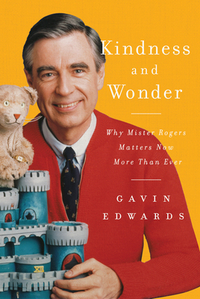Take a photo of a barcode or cover
I didn't know his background. I loved Mr. Roger's growing up. It was a great book. Quick read.
A beautiful biography of one of the top five influential people in my life.
The ultimate calm you felt while watching his show is easily remembered as you read this book. We can all use a little more firm kindness in our lives. Uncompromising kindness for all.
An absolute delight of a biography. I listened to the audio book and the narrator was particularly adept at his reading, especially at how he subtly differentiated between Fred Rogers' quotes and everything else.
I grew up watching Mr Rogers but didn't know that much about him or the history of the show. I still haven't seen the documentary or movie with Tom Hanks. It was never my favorite kids show -- I was a Sesame Street fan through and through -- having always thought of Mr Rogers as the boring old fashioned kids show and assuming the man in the cardigan was just as stodgy as my perception of the show.
HOW I WAS WRONG.
The thoughtful psychological considerations that went into the production of Mr Rogers shows (not just the famous Mister Rogers Neighborhood but the previous incarnation The Children's Corner and later variations on the Neighborhood) focused on the emotional intelligence and well being of the children. Every single decision about characters, topics, narratives, and presentation were dictated by "what is best for the child? What will the child *feel* watching this? How can we support the emotional development of the child?", which is a vast departure from most children's programming back in the day; the earliest kids shows were all slapstick, wild pie throwing, mindless kinds of entertainment, and Sesame Street and its successors focused on intellectual growth and cognitive development. Rogers' shows were quiet, still, not rushed, and incredibly thoughtful, which was kind of radical in its own way. Nothing had ever been done in that style before and he had many many detractors in the beginning, people who just didn't think it would work or who didnt understand what (or WHY) he was attempting to do.
But Fred Rogers accomplished something remarkable, and used his religious studies and seminary background to minister kindness and compassion to children. I had no idea he was a man of faith, and while I myself am not religious and am often suspect of people who claim to be (since their actions so often do not match their words), I am completely impressed by and enamored with his approach to helping the children of America. MisterRogers.org releases five old episodes a week for free, and after watching a few, I realize that they are not the stodgy, old fashioned, boring content that I had assumed, but that they are quite genius in their quiet, open hearted, welcoming way. I wondered if Skyler, only 17 months, would find it interesting at all given that the few editing cuts and lack of flash, but he was immediately taken by the gentle man and the cast of puppet characters. We will be adding the land of make believe into the little amount of screen time we allow.
Aside from being a thoroughly researched and well-written biography of a man and his craft, this book provided a detailed and fascinating look into the evolution of TV production. Rogers began making public children's television in the fifties, and continued to do so through the 90s. Learning how much -- and often, how little -- actually changed throughout the decades was a fun jaunt through pop culture history. Any film making or TV nerd, like me, will get a kick out of the behind the scenes of this iconic TV show.
In addition to the crash course in old timey TV production, the book digs into childhood psychology quite a bit, as Fred Rogers was dedicated to creating content founded in the science. He consulted with many renowned child psychologists and therapists over the years, and engaged in therapy himself. I find his commitment to mental health remarkable given the era he comes from, an age before everyone and their mother went to therapy and certainly before it was commonly accepted in the mainstream to do so.
The first half of the book tells the narrative of Rogers' life, starting in his childhood, and focusing on his professional endeavors as he ages. The second half of the book is Ten Ways that we can each be more like Fred Rogers, which sounds like a self help book but reads more like a bunch of stories and anecdotes that wouldn't fit in the biography, linked together by the common theme of that particular "way" to be like Fred. For example, Always Be Honest is one of the ten ways, and the stories that the author presents all relate to that theme, providing us both more biographical insight into the man as well as spiritual guidance for being better humans.
I highly recommend this book to ANYONE interested in: child psychology and parenting, television history, how Christians can minister without explicitly evangelizing (and thereby alienating many people), or if you grew up watching Mister Rogers Neighborhood. It was a wonderful read and it's not super long (only 6 hours on the audio book). You will smile through it and be inspired to be a better neighbor to everyone.
I grew up watching Mr Rogers but didn't know that much about him or the history of the show. I still haven't seen the documentary or movie with Tom Hanks. It was never my favorite kids show -- I was a Sesame Street fan through and through -- having always thought of Mr Rogers as the boring old fashioned kids show and assuming the man in the cardigan was just as stodgy as my perception of the show.
HOW I WAS WRONG.
The thoughtful psychological considerations that went into the production of Mr Rogers shows (not just the famous Mister Rogers Neighborhood but the previous incarnation The Children's Corner and later variations on the Neighborhood) focused on the emotional intelligence and well being of the children. Every single decision about characters, topics, narratives, and presentation were dictated by "what is best for the child? What will the child *feel* watching this? How can we support the emotional development of the child?", which is a vast departure from most children's programming back in the day; the earliest kids shows were all slapstick, wild pie throwing, mindless kinds of entertainment, and Sesame Street and its successors focused on intellectual growth and cognitive development. Rogers' shows were quiet, still, not rushed, and incredibly thoughtful, which was kind of radical in its own way. Nothing had ever been done in that style before and he had many many detractors in the beginning, people who just didn't think it would work or who didnt understand what (or WHY) he was attempting to do.
But Fred Rogers accomplished something remarkable, and used his religious studies and seminary background to minister kindness and compassion to children. I had no idea he was a man of faith, and while I myself am not religious and am often suspect of people who claim to be (since their actions so often do not match their words), I am completely impressed by and enamored with his approach to helping the children of America. MisterRogers.org releases five old episodes a week for free, and after watching a few, I realize that they are not the stodgy, old fashioned, boring content that I had assumed, but that they are quite genius in their quiet, open hearted, welcoming way. I wondered if Skyler, only 17 months, would find it interesting at all given that the few editing cuts and lack of flash, but he was immediately taken by the gentle man and the cast of puppet characters. We will be adding the land of make believe into the little amount of screen time we allow.
Aside from being a thoroughly researched and well-written biography of a man and his craft, this book provided a detailed and fascinating look into the evolution of TV production. Rogers began making public children's television in the fifties, and continued to do so through the 90s. Learning how much -- and often, how little -- actually changed throughout the decades was a fun jaunt through pop culture history. Any film making or TV nerd, like me, will get a kick out of the behind the scenes of this iconic TV show.
In addition to the crash course in old timey TV production, the book digs into childhood psychology quite a bit, as Fred Rogers was dedicated to creating content founded in the science. He consulted with many renowned child psychologists and therapists over the years, and engaged in therapy himself. I find his commitment to mental health remarkable given the era he comes from, an age before everyone and their mother went to therapy and certainly before it was commonly accepted in the mainstream to do so.
The first half of the book tells the narrative of Rogers' life, starting in his childhood, and focusing on his professional endeavors as he ages. The second half of the book is Ten Ways that we can each be more like Fred Rogers, which sounds like a self help book but reads more like a bunch of stories and anecdotes that wouldn't fit in the biography, linked together by the common theme of that particular "way" to be like Fred. For example, Always Be Honest is one of the ten ways, and the stories that the author presents all relate to that theme, providing us both more biographical insight into the man as well as spiritual guidance for being better humans.
I highly recommend this book to ANYONE interested in: child psychology and parenting, television history, how Christians can minister without explicitly evangelizing (and thereby alienating many people), or if you grew up watching Mister Rogers Neighborhood. It was a wonderful read and it's not super long (only 6 hours on the audio book). You will smile through it and be inspired to be a better neighbor to everyone.
This book made me quite nostalgic for my childhood, and made me wish my kids and grandkids were able to enjoy this kind man.
I needed this book right now. Between the coronavirus pandemic and the Black Lives Matter protests, it's a stressful time. This book gives a great overview of the life and philosophies of Fred Rogers, and it was a pleasure to read (even though it made me cry). I'm so glad this world had Mister Rogers in it, and I hope his legacy of acceptance and kindness and compassion will continue to inspire people.
emotional
hopeful
informative
inspiring
medium-paced
hopeful
inspiring
medium-paced
inspiring
reflective
medium-paced
emotional
hopeful
informative
inspiring
lighthearted
reflective
relaxing
medium-paced



